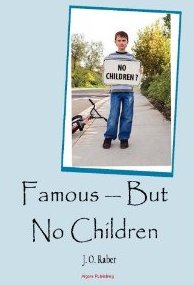In author J.O. Raber’s words, Famous – But No Children “is about people who have made an important difference because they were more oriented toward making that difference than toward living the conventional life of rearing children. This is not to say that people with children have never made a difference; however, the accomplishments of many of history’s great men and women were often the consequence of their non-conventionality and their non-procreation.”
Raber looks at the choice to have no children through the lives of many notable people from history. The book reflects some serious digging and research to come up with an extensive list and description of people from all professions, including but not limited to: artists, actors, adventurers, architects, cartoonists, champion athletes, choreographers, classical musicians comedians, conductors, culinary stars, dancers, editors, fashion designers, filmmakers/directors, founders, historians, inventors, journalists, judges, lyricists, mathematicians, news reporters, Nobel Prize winners, opera singers, notable educators, popular singers/musicians, philanthropists, philosophers, pioneer physicians, political and world leaders, scientists, social reformers, talk show hosts, writers and even a list of Super Centenarians!
It is comprehensive to say the least, as is a collection of quotes on why they did not have children. In addition to the nod to so many great people who did not procreate, Raber discusses this choice from a number of angles.
He takes us back to the Ann Landers survey done in the 1970s that asked this question: “If you had it to do over again, would you have children?” He goes into more detail than I have seen in other places that discuss this famous survey. If you don’t know how many responded “No,” all I can say is, you might be surprised.
Like other books on those with no children out there, Raber discusses some of the frequently asked questions of those with no children (e.g., Don’t you like children? Don’t you care about carrying on your family name? Who will take care of you when you are old?), and gives his answers.
Raber goes beyond this and bravely goes into philosophical topics as well, such as moral considerations for having children in today’s world. He asks the philosophical question: Do future generations have a right to be born? The answer has to do with potential suffering. In his words,
“How do we know in advance how much an individual might suffer? We can really only evaluate this question in terms of such qualities as the potential health of a future person (freedom from physical pain or physical restrictions) and the family circumstances into which a person will be born (opportunities during the formative years) and the political climate which prevails at the time (potential for personal autonomy at a societal level) and whether that person will have an open future (the freedom to choose his or her own future without restrictions due to adversities regarding any of the above).” He ultimately asks the question, “What level of suffering is acceptable?”
Philosophical discussion aside, Raber’s list of the famous with no children will leave you with this takeaway: They were not and are not an anomaly. They have been everywhere for generations.
Do you want to know about amazing people from history who had no children? In the midst of deciding whether you want to become a parent? Interested in social and moral considerations related to reproduction in today’s society? If you answer yes to any of these questions, check out Famous – But No Children.


